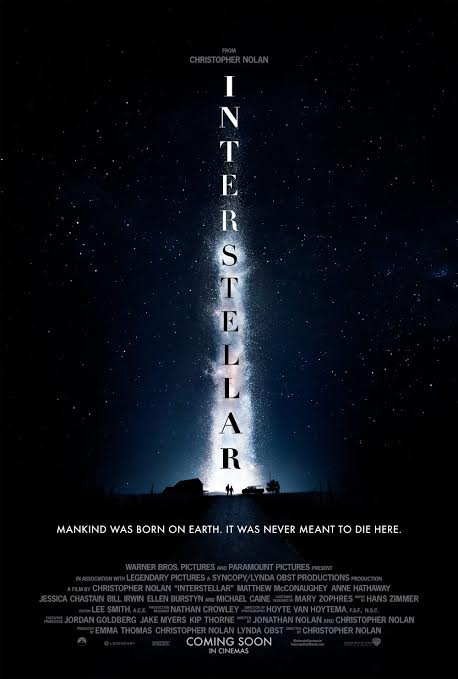 By Kristin Wilinkiewicz | Co-Editor-in-Chief
By Kristin Wilinkiewicz | Co-Editor-in-Chief
In short, Interstellar was an incredible film grounded in mind-bending scientific ideas, but is surprisingly easy to process and fiercely human at its core. In fact, it’s such an amazing experience, you overlook a lot of the issues the movie has, and enjoy it for what it is; a feast for both your mind and senses.
What’s so remarkable about space is its ability to stretch the imagination, which makes it the perfect subject matter for a director like Christopher Nolan, who has recently become a household name in moviemaking. Nolan is known for cerebral films like Inception, and is extremely dedicated to his projects. Interstellar was no exception for Nolan, working with theoretical physicist Kip Thorne as both an executive producer and the scientific basis for many of the elements within the film.
Cooper, a single father and ex-engineer, is asked to be the pilot of a space exploration team, hoping to find another inhabitable planet. This mission is humanity’s last chance at survival, as pollution has left corn as the last source of food on a dying earth. His motivation is his intense love for his daughter, Murphy, is more important than the entirety of the human race to a father.
The film is so jam-packed with such interesting scientific material, it’s hard to imagine anyone walking out of the theater without their mind reeling. It’s insanely interesting stuff—black holes, time dilation, quantum physics—and knowing these depictions are based in actual scientific fact makes the film even more compelling.
The film is careful not to leave its viewers in the dust with scientific jargon, though. So what you get is a digestible peek into the theories of quantum physics and space exploration. It’s just enough to get you discussing.
Nolan adds more than just science to the equation, though. His commentary on the nature of humans and their place in the universe is territory that stretches far beyond the capacity of any project he’s taken up to date. It’s profound, and it makes you think. As insignificant as it makes you feel and as lonely as space can seem, Interstellar is surprisingly hopeful. It’s a story about the survival of man, and finding where we fit, however small we may seem.
The organ-based score, composed by Hans Zimmer, is just another flawlessly executed element of the film. It gives a sense of our imminent Judgment Day, booming through speakers and filling the room with a dark, towering sound that’s as vast and hollow as space.
But because this is a Nolan film, Interstellar has been held to a higher standard than most by both critics and casual movie-goers. Whether that’s deserved or not, I don’t know, but there were undeniable flaws that were hard to overlook.
Supporting characters often seemed like afterthoughts, though character development has never been Nolan’s specialty. In some cases, characters are so insignificant I have no clue why they existed in the first place.
In fact, the only actor who I was actually impressed by was Matthew McConaughey, who absolutely embodied the ultimate father figure. Everyone else seemed either just average or, at some points, even sub-par.
The script, which was written by both Christopher Nolan and his brother, at times tries too hard to make grandiose statements like “Mankind was born on earth, it was never meant to die here,” part of a casual conversation you’d have on the front porch of your farmhouse on any given day. By putting those quotes in a casual setting, they lacked impact or sounded ridiculous… Which is unfortunate, because it brought a lack of credibility to the dialogue that otherwise could have been used as a positive asset.
And, overall, I felt underwhelmed. I wanted the film to have a crippling emotional impact on me, but it seemed to just fall short of doing that. It had its moments that chilled me, but nothing that made me shiver in my seat.
You’ll also find pages of articles upon articles written about the convenience of a lot of aspects in the movie, but I think that if you start looking at convenience as something that doesn’t belong in a film like this, you don’t have a plot. You have to overlook the fact that things have to work when the plot needs them to work in order to have a compelling story.
Regardless of those flaws, though, this movie was incredible. In fact, when watching it, I was completely able to forget about the issues Interstellar had, and become completely engrossed in the storytelling. It is entirely worth watching, even if you have no interest in Nolan or space exploration in the slightest, because for all of its technical prowess, at its heart, it’s a story that’s more human than anything I’ve seen this year so far.
Interstellar is being shown in 6 formats; IMAX 70mm Film, IMAX Digital, 70mm Film, 4K Digital, Digital, and what I saw it in, 35mm Film. As much as I love the 35mm format, I’d encourage you to go see this film in an IMAX format to experience everything it has to offer in terms of visuals and sound.



